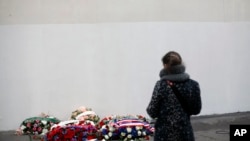French satirical magazine Charlie Hebdo is republishing caricatures of the Prophet Mohammad which unleashed a wave of anger in the Muslim world to mark the start of the trial of alleged accomplices in the militant attack against it 2015.
Among the cartoons, most of which were first published by a Danish newspaper in 2005 and then by Charlie Hebdo a year later, is one of Mohammad wearing a bomb-shaped turban with a lit fuse protruding.
"We will never lie down. We will never give up," editor Laurent "Riss" Sourisseau wrote in a piece to accompany the front cover that will be published in print on Wednesday.
Twelve people, including some of the magazine's best-known cartoonists, were killed when Said and Cherif Kouachi stormed the Paris offices of Charlie Hebdo and sprayed the building with automatic gunfire.
The Kouachi brothers and a third Islamist gunman who killed five people in the 48 hours that followed the Charlie Hebdo massacre were shot dead by police in different stand-offs, but 14 of their alleged accomplices go on trial on Wednesday.
The decision to republish the cartoons will be seen by some as a defiant gesture in defense of free expression. But others may see it as a renewed provocation by a magazine that has long courted controversy with its satirical attacks on religion.
After the 2006 publication of the cartoons, Jihadists online warned the weekly would pay for its mockery. For Muslims, any depiction of the Prophet is blasphemous.
"The freedom to caricature and the freedom to dislike them are enshrined and nothing justifies violence," the French Council of the Muslim Faith wrote on Twitter in response.
Muslims have previously said the turban cartoon branded all Muslims as terrorists, as did a Charlie Hebdo cartoon showing the Prophet reacting to Islamist militants by saying: “It’s hard to be loved by idiots.”
In 2007, a French court rejected accusations by Islamic groups that the publication incited hatred against Muslims.





